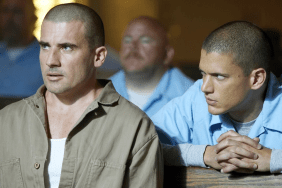Luiz Carlos Vasconcelos as Doctor
Milhem Cortaz as Dagger
Milton Gonçalves as Chico
Ivan de Almeida as Ebony
Ailton Graça as Highness
Maria Luisa Mendonça as Dalva
Aida Leiner as Rosirene
Rodrigo Santoro as Lady Di
Gero Camilo as No Way
Caio Blat as Deusdete
Ricardo Blat as Miro
Gabriel Braga Nunes as Sérgio
Walter Breda as Antônio
Rita Cadillac as Herself
Leona Cavalli as Dina
André Ceccato as Bristles
José de Paiva as Charuto
Vanessa Gerbelli as Célia
Antônio Grassi as Pires
Sabrina Greve as Catarina
Júlia Ianina as Francineide
Sérgio Loroza as Gordo
Nelson Machado as Carioca
Luis Miranda as Paulo Boca
Wagner Moura as Zico
Dionísio Neto as Lula
Robson Nunes as Dadá
Marcelo Palmares as Coelho
Floriano Peixoto as Antônio Carlos
Lázaro Ramos as Ezequiel
Story:
In the early 90’s, a doctor arrived at Sao Paolo’s Carandiru prison to educate the men about preventing AIDS. Shocked by the overcrowded situations, he tried to make the most of it, keeping a positive attitude as he befriended some of the 7,000 inmates and listened to their stories about how they ended up at the prison. Despite his best intentions, it’s hard to change the system overnight and drugs and violence continue to pervade the community, ultimately leading to a tragic event that would change life in the prison forever.
Analysis:
South American director Hector (Kiss of the Spider-Woman) Bambeco has taken a decidedly different turns for his first film in seven years with a prison drama based on true stories from behind the prison walls as told to and by Dr. Drauzio Valera. The movie shows another side of the criminal life featured in last year’s excellent City of God, focusing more on those that have been caught by the system and how prison life affects them. Shot in the actual prison before its destruction a few years back, the realities of prison life-drugs, rape, and violence-are countered by lighter stories told by the inmates to the doctor, which quickly establish and develop the characters, something often hard to do with such a large ensemble cast.
The subject matter is not one that you’d expect would lend itself to levity, but Carandiru‘s best moments will make you laugh and smile, as you learn more about some of the different inmates. The prisoner named “Highness” tells a funny story about his infidelities with the two women who mothered his children, and an armed robbery is made more amusing by a crook in a Santa Claus outfit. Some of the stories are more poignant like the one involving the lifelong inmate who patiently awaits the chance to meet some of his illegitimate children. In another one, two childhood friends, Deusdete and Zica, discover how different things are behind prison bars, as the younger one is surprised by the change in his friend due to drug abuse. Most of these stories converge at Carandiru’s annual visiting day where the families of the inmates come together.
With such a large ensemble cast, one would hope for many strong performances, but only a few of them really stand out. Clearly the best performance comes from Ivan de Almeida, who brings depth to the prison’s kingpin and “den mother” Ebony, a role that allows him the widest range of emotions. Likewise, Wagner Bouca does a great job as Zica, a drug dealer who only has a meager jail time ahead of him before things start getting to him. As an innocent counterpoint, Caio Blat plays well off Bouca’s strong performance as his friend. Dionísio Neto is also good as Lula, the violent criminal driven to religion by his guilt. By comparison, Luiz Carlos Vasconcelos’ Doctor has few lines and spends most of the movie standing around and smiling at the stories being told to him.
The movie is moving along well until halfway through, when things begin to border on the absurd, starting with the love affair between the doctor’s assistant and a pre-op transsexual, which culminates in a full-blown drag wedding. Things get even stranger with an appearance by sexy Brazilian actress Rita Cadillac and a huge soccer match, both of which make it seem like prison life is one big party, something that couldn’t be further from the truth.
As you’re enjoying the light-hearted stories of these inmates, things suddenly get dark. As one murder leads to bloody revenge, you’re reminded of the reality that these loveable scamps are all hardened criminals and murderers. By the time Babenco gets around to showing the famous 1992 Carandiru riots, it seems almost like an afterthought, and the movie changes gear into a Schindler’s List like expose of the harsh and brutal riot squad laying siege to a prisoners’ protest, murdering 111 unarmed inmates in the process. The event is narrated by some of the inmates, explaining how things went down. There is a serious credibility problem at work when you realize that the movie is based on stories told by the inmates to the doctor, who was conveniently away from the prison at the time of the riots. It’s hard to believe that the police would have reacted so violently without any provocation from the inmates, so the events depicted seem false and deceiving, especially after seeing the inmates lie and exaggerate throughout the movie.
At least Babenco spends most of the movie making the criminals likeable, so that you can feel closer to them when thing start going bad. Still, you can’t help but feel that Babenco is purposefully manipulating your emotions when he drives the point home with powerful images of blood running down the prison steps and a scene of the prison’s eventual destruction a few years ago.
The Bottom Line:
With such a strong subject matter and an important historical event at its core, Carandiru could and should have been a great movie. Babenco’s desire to over-develop the characters and instill the story with humor takes too much away from gravity of the central story, making this overly long movie too erratic for its own good. Those waiting for the next City of God will have to keep waiting.










